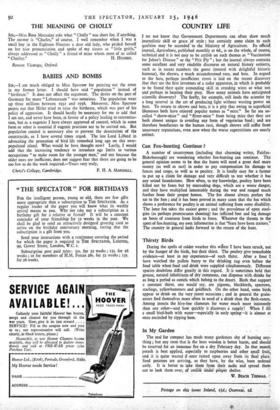COUNTRY LIFE
I no not know that Government Departments can often show much journalistic skill or grace of style ; but certainly some claim to such qualities may be accorded to the Ministry of Agriculture. Its officiat journal, Agriculture, published monthly at 6d., is on the whole, of course, technical and it is not easy to be stylish on such themes as "Vaccination for Jolute's Disease" or the " Frit Fly" ; but the journal always contains some excellent and very readable discourse on natural history subjectsj such as in recent numbers the goose (treated with delightful historic humour), the shrews, a much misunderstood race, and bats. In regard to the bats, perhaps insufficient stress is laid on the recent discovery that they are the first inventors of a radar apparatus, in which is probably to be found their quite astounding skill in avoiding wires or what "not and perhaps in locating their Prey. How many animals have anticipated scientific discovery? The firefly, for example, still leads the scientist by a long interval in the art of producing light without wasting power on heat. To return to shrews and bats, it is a pity that owing to superficial likenesses both have enjoyed popular names as "mice." So far are so- called " shrew-mice " and " flitter-mice " from being mice that they are both almost unique in avoiding any form of vegetarian food ; and are therefore benefactors to the human race, though shrews still suffer from unsavoury reputations, even now when the worse superstitions are nearly extinct.
Can Fox-hunting Continue ?
A number of countrymen (including that charming writer, Fairfax- Blakeborough) are wondering whether fox-hunting can continue. The general opinion seems to be that the hunts will need a great deal more money (as well as tact) in order to pay compensation for damage to fences and crops, as well as to poultry. It is fatally easy for a farmer to put up a claim for damage and very difficult to test whether it has any sound foundations. How often, to my knowledge, poultry have been killed not by foxes but by marauding dogs, which are a worse danger, and they have multiplied lamentably during the war and ranged much further from their proper homes. The fox almost always prefers the rat to the hen ; and it has been proved in many cases that the fox which shows a preference for poultry is an animal suffering from some disability. The lame fox takes the easiest game ; and the prevalence of open steel- gins (as perhaps promiscuous shooting) has inflicted foot and leg damage on hosts of creatures from birds to foxes. Whatever the threats to the sport of fox-hunting, my own information is that "fears have been traitors." The country in general looks forward to the return of the hunt.
Thirsty Birds During the spells of colder weather this winter I have been struck, not by the hunger of the birds, but their thirst. The poultry give remarkable evidence—at least in my experience—of such thirst. After a frost I have watched the pullets hurry to the drinking cup even before the food table when food and drink were supplied simultaneously. Different species doubtless differ greatly in this regard. It is sometimes held that grouse, natural inhabitants of dry commons, can dispense with drinks for as long a period as caniels which belong, to the desert. Birds that support a constant thirst, one would say, are pigeons, blackbirds, sparrows, starlings, yellowhammers and goldfinch. On the other hand, some birds appear to drink on the very rarest occasions ; and in general the grain- eaters find themselves more often in need of a drink than the flesh-eaters. Among insects the hive-bee clamours for water. much more insistently than any other—and how quickly it discovers a supply! When I fill a small bird-bath with water—especially in early spring—it is almost at once encircled by sipping bees.
In My Garden
The zeal for compost has made many gardeners shy of burning any ; but any stem that is the least wooden is better burnt, and should be reserved for an immense fire on a dry February day. In that month potash is best applied, especially to raspberries and other small fruit, and it is quite wasted if once rained upon away from its final place. Seed potatoes are arriving, as they have, by the wise, been ordered early. It is better to take them from their sacks and spread them out to look them over, Of coü mmnde pioper shelter.
W. BEACH THOMAS.






























 Previous page
Previous page